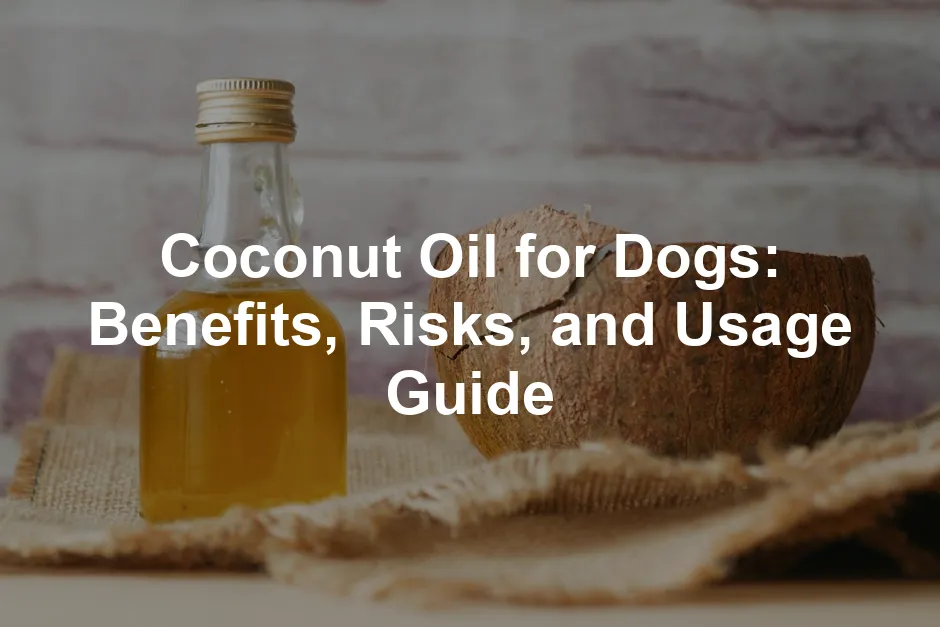Introduction
Coconut oil is becoming a favorite in pet care. Many dog owners are curious about its potential benefits. While coconut oil may help your furry friend, it’s important to weigh the pros and cons carefully. Always consult with your veterinarian before adding new supplements to your dog’s diet.
Summary and Overview
Coconut oil comes from the flesh of mature coconuts. This oil is rich in saturated fats, primarily medium-chain triglycerides (MCTs) and lauric acid. These components are believed to offer various health benefits. Some claims include improved skin health and enhanced digestion. However, potential risks also exist, including digestive upset and weight gain. Always use coconut oil in moderation and seek veterinarian guidance for safe usage.
MCTs are a type of fat that your dog can metabolize quickly. They might provide energy and support brain health. Lauric acid, found abundantly in coconut oil, has antibacterial and antifungal properties, which can be beneficial for your dog. Despite these advantages, it’s essential to be cautious. Too much coconut oil can lead to gastrointestinal issues and obesity. Always discuss with your vet before making changes to your dog’s diet.
In summary, coconut oil can offer benefits but also carries risks. Moderation is key, and veterinary advice is crucial for your dog’s health and safety.

Skin and Coat Health
Coconut oil is a popular remedy for dogs with dry skin. It can soothe irritation and restore moisture. Many dog owners report that it makes their pets’ coats shinier and healthier. The fatty acids in coconut oil penetrate the skin, providing hydration and relief.
Moreover, coconut oil has antibacterial and antifungal properties. This can help prevent infections and soothe skin conditions. For instance, many owners have shared stories of using coconut oil for hot spots and minor irritations. Their feedback highlights its effectiveness in promoting overall skin health.
If you’re looking for a reliable source of high-quality coconut oil for your dog, consider Organic Virgin Coconut Oil. It’s perfect for skin applications and can also be used in your dog’s diet for added health benefits.
For more information on skin issues like hot spots, check out this article on hot spots on dogs.

Digestion and Weight Management
Coconut oil may also support your dog’s digestive health. It can aid in nutrient absorption, making it easier for your dog to get the most from their food. Additionally, some dog owners have observed that coconut oil helps manage their pets’ weight. The medium-chain triglycerides (MCTs) in coconut oil can increase metabolism, helping dogs burn more calories.
There are indications that coconut oil might positively impact gut health. Some studies suggest it could be beneficial for dogs with inflammatory bowel disease (IBD). However, always consult your vet before making dietary changes.
To further enhance your dog’s digestive health, consider adding Dog Supplements (Omega-3) to your dog’s diet. These supplements can promote a healthy coat and support overall well-being.

Cognitive Function and Brain Health
Coconut oil is often discussed regarding cognitive benefits, especially for older dogs. Some anecdotal evidence suggests that it might help with memory and mental clarity. A few studies on MCTs indicate potential improvements in cognitive function, leading to increased interest in coconut oil for pets.
Veterinary experts suggest that the lauric acid in coconut oil may support brain health. This could be particularly beneficial for aging dogs who may experience cognitive decline. While more research is needed, many dog owners are hopeful about these potential benefits.
If you’re interested in more ways to support your dog’s brain health, check out Dog Behavior Books. They provide insights on how to understand and improve your dog’s behavior, which can also positively affect their mental health.

Allergic Reactions
Coconut oil can cause allergic reactions in some dogs. Look for signs like itching, hives, or gastrointestinal upset. If you notice these symptoms, stop using coconut oil immediately.
When introducing coconut oil, monitor your dog for at least a week. Gradually increase the amount if there are no adverse effects. Keeping a journal can help track any changes. This way, you can easily pinpoint any issues that arise.

For those accidents that might happen, it’s wise to have a Dog First Aid Kit on hand. It’s essential for any pet owner to be prepared for emergencies!
For more information on recognizing allergic reactions in dogs, especially after bee stings, check this helpful article: how to recognize allergic reactions in dogs after bee stings.

Weight Gain and Cholesterol Levels
Coconut oil is high in calories, which can lead to weight gain. One teaspoon contains about 120 calories. If your dog consumes too much, you may notice weight changes.
Some studies suggest that coconut oil can increase cholesterol levels in dogs. While it may raise good cholesterol, it can also elevate bad cholesterol. This balance is essential for your dog’s overall health. Always consult with your veterinarian to determine safe amounts for your dog.

How to Safely Use Coconut Oil for Dogs
Choosing the Right Coconut Oil
When selecting coconut oil, opt for unrefined or virgin options. These types retain more nutrients and are less processed. Look for organic and cold-pressed varieties for the best quality. Avoid refined coconut oils as they often contain additives. Always read labels carefully to ensure you’re getting pure coconut oil.

Recommended Dosage
Start with small amounts based on your dog’s size. For small breeds, begin with 1/4 teaspoon daily. For larger breeds, a tablespoon is a safer starting point. Gradually increase the dosage after a week if your dog tolerates it well. Aim for about 1 teaspoon per 10 pounds of body weight. Adjust according to your dog’s response and always consult your vet for personalized guidance.

Methods of Application
Coconut oil can be a versatile addition to your dog’s routine. Here’s how you can incorporate it effectively.
In Food
Start by blending coconut oil into your dog’s meals. You can warm it slightly to make it easier to mix. This method not only enhances the taste but also provides health benefits.
Topical Application
For skin issues, apply coconut oil directly to affected areas. Massage it gently into the skin for maximum absorption. This can soothe hot spots and dry patches.
Homemade Treats
Why not whip up some tasty treats? Here are a couple of simple recipes:
- Peanut Butter Coconut Treats
– 1 cup peanut butter (ensure it’s xylitol-free)
– 1/2 cup coconut oil
– 1 cup oats
Mix all ingredients, shape them into small balls, and refrigerate until firm. You can also use Dog Treats (Peanut Butter Flavor) for an extra flavor boost! - Frozen Coconut Delight
– 1 banana
– 1/2 cup coconut oil
– 1/4 cup peanut butter
Blend everything together, pour into molds, and freeze. This makes a refreshing treat on hot days.
These methods ensure your dog enjoys the benefits of coconut oil while keeping things fun and tasty. Always monitor your dog’s reaction to new foods and adjust as needed.

Topical Applications of Coconut Oil
Coconut oil is not just for cooking; it can also work wonders on your dog’s skin and dental health.
Skin Treatments
Coconut oil can be a soothing balm for your dog’s skin. If your pup suffers from hot spots, dry patches, or minor irritations, apply a thin layer of coconut oil directly to the affected area. Its antibacterial and antifungal properties can promote healing. Additionally, it may act as a natural deterrent for fleas and ticks when applied to the coat.

Dental Care
Good dental hygiene is crucial for your dog’s overall health. Coconut oil can support this by acting as a natural toothpaste. Rub a small amount directly on your dog’s teeth or mix it into their regular toothpaste. This helps reduce plaque and fight bacteria, leading to fresher breath. For best results, incorporate this into your regular dental routine to keep your dog’s mouth healthy.

For extra dental care, consider using Dog Dental Chews. They can help keep your dog’s teeth clean and promote fresh breath.
Conclusion
Coconut oil can provide various benefits for dogs, from improving skin health to enhancing dental hygiene. However, it’s essential to approach its use with care. Always consult your veterinarian before adding coconut oil to your dog’s diet or routine. Monitor your pet for any adverse reactions and adjust usage as necessary. Remember, moderation is crucial to ensure your dog enjoys the health benefits without any risks.
FAQs
Can I give my dog coconut oil every day?
Yes, but moderation is essential. Start with small amounts. For small dogs, give about 1/4 teaspoon. Larger dogs can take up to 1 tablespoon daily. Monitor your dog for any digestive issues. Gradually increase the amount if your dog tolerates it well. Always consult your vet for personalized advice.
What type of coconut oil is best for dogs?
Opt for organic, virgin coconut oil. This type is less processed and retains more nutrients. Cold-pressed options are ideal, as they preserve beneficial properties. Avoid refined coconut oils, as they may contain additives that are less healthy for your dog.
How can I tell if my dog is allergic to coconut oil?
Watch for signs of an allergic reaction. Common symptoms include itching, hives, or gastrointestinal upset. If you notice any of these, stop using coconut oil immediately. Monitor your dog closely after introducing it to their diet. Keeping a record can help identify potential issues.
Is coconut oil good for dog breath?
Coconut oil may help freshen your dog’s breath. Its antimicrobial properties can combat bacteria that cause bad breath. Incorporating coconut oil into your dog’s dental routine could lead to fresher breath. However, it’s not a substitute for regular dental care.
Can puppies have coconut oil?
Yes, but introduce it cautiously. Puppies have sensitive stomachs, so start with tiny amounts. Monitor for any adverse reactions. Consult your veterinarian for guidance on how much to give based on your puppy’s size and health.
What should I do if my dog consumes too much coconut oil?
If your dog consumes too much coconut oil, watch for signs of digestive upset, like diarrhea or vomiting. Offer plenty of fresh water and monitor their condition. If symptoms persist, contact your veterinarian for further advice.
Are there alternatives to coconut oil for dogs?
Yes, there are several alternatives. Fish oils, such as salmon or krill oil, offer similar benefits for skin and coat health. Flaxseed oil is another option rich in omega-3 fatty acids. Always check with your veterinarian before making any changes to your dog’s diet.
Please let us know what you think about our content by leaving a comment down below!
Thank you for reading till here 🙂

Additionally, if you’re considering a fun way to keep your dog engaged, check out Dog Puzzle Toys. They can provide mental stimulation and keep your dog entertained for hours!

And for those outdoor adventures, don’t forget to equip your furry friend with a Dog Travel Carrier for comfort and safety on the go.

Lastly, consider investing in a Dog Cooling Mat for those hot summer days. Your pup will thank you for it!
All images from Pexels





